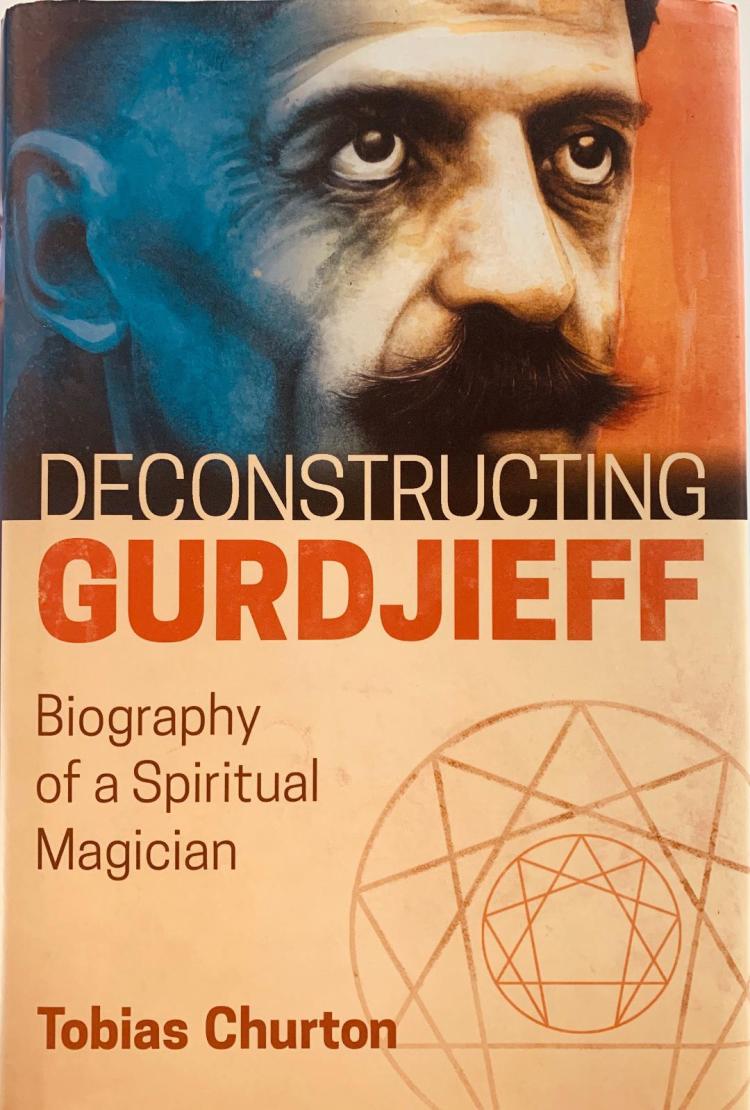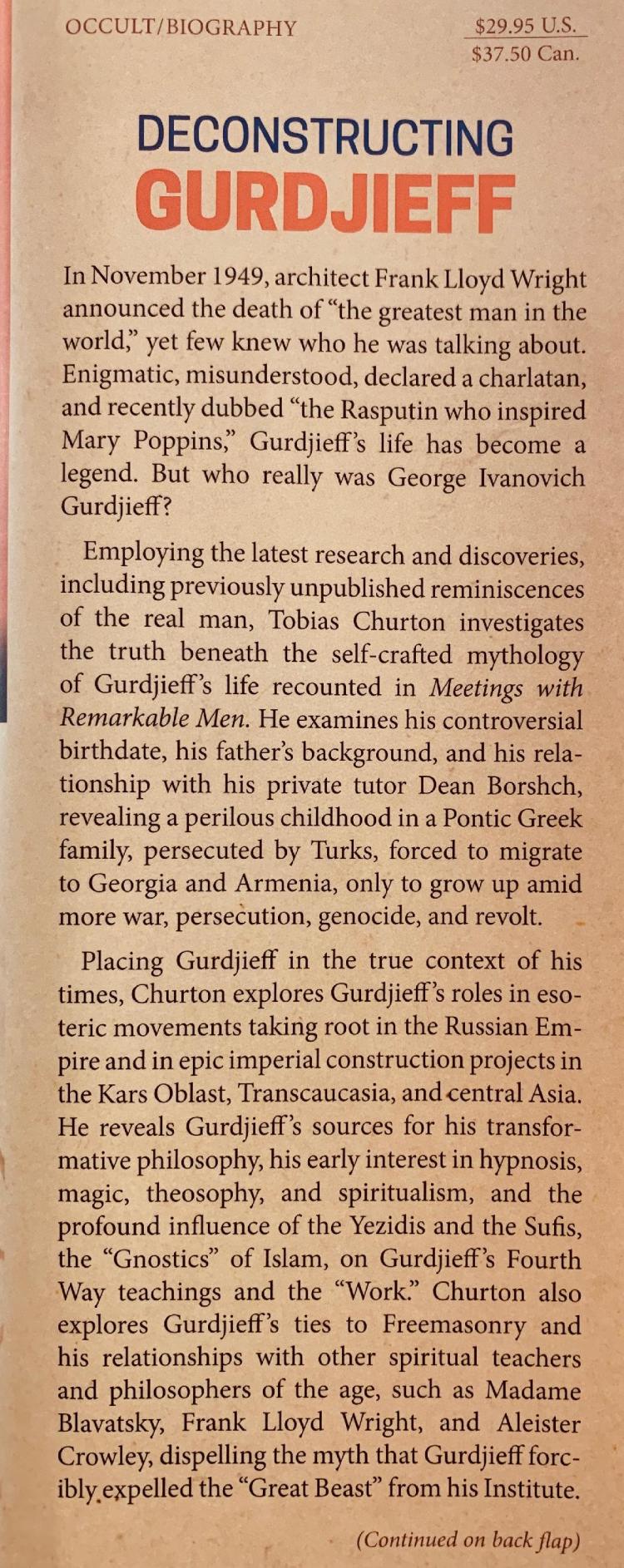
P.L. Travers was a pupil and a lifelong follower of the somewhat controversial spiritual teacher G.I. Gurdjieff. And, it must be stressed right from the start that his teachings are difficult to grasp by people not versed in esotericism. I know I struggled with them enormously at the beginning. And those who are less spiritually inclined readily categorize him as a charlatan. The debate remains.
Gurdjieff was a peculiar character. He did some strange things and, on some occasions, gave downright weird advice to his followers. But then, he also told them not to take anything at face value. His teaching methods were unorthodox, and they did involve humiliation tactics in a group work dynamic, and forced alcohol consumption in the form of the ritual “Toasts to the Idiots.” He believed that human beings needed shocks from outside in order to awaken to their inner truth.
He also used drugs and hormones with a closed group of his pupils known as the Rope. Peculiar or not, he managed to create a system and a following to our present days, and thus he deserves to be taken seriously even if only to understand the psyche of the people who needed his advice. And since I am very much interested in P.L. Travers’s psyche, I had to take Gurdjieff into account.
I didn’t know anything about him until I began investigating the life and literary works of P.L. Travers. To my surprise, I found out that there is an enormous amount of literature on the subject of Gurdjieff and his teachings.
He wrote four books: The Herald of Coming Good, Beelzebub’s Tales to His Grand Son, Meetings with Remarkable Men, and Life is Real Only Then When I am. (The Herald of Coming Good is the only one that was published during his lifetime.) There are also the transcripts of some of his meetings with his pupils during different time periods of his teaching, there are books written by his pupils, books by his modern-day followers, and books explaining his esoteric ideas. Plus, there are the biographies. And I wanted to read a biography, I wanted to gain some insight into Gurdjieff’s personality in order to better understand the potential causes for his immense influence on P.L. Travers.
Now how was I to choose the right biography? Well, simple. I followed my intuitive pull to a title. I chose a book by its cover. Deconstructing Gurdjieff by Tobias Churton.
I liked the idea of deconstructing something into its forming parts in order to gain a better understanding of its inner workings and what is more, Gurdjieff metaphorically described human beings as machines operating on autopilot. So, I found that there was a certain humor in the title, a tiny mischievous wink in Gurdjieff’s direction.

My intuition didn’t disappoint me, intuition rarely does.

What makes Deconstructing Gurdjieff an enjoyable read is the combination of Churton’s expertise in Western Esoterics with his good sense of the historical context of Gurdjieff’s life and his psychological understanding of Gurdjieff’s complex personality.
The effect of Churton’s deconstruction is the exact opposite, the construction of a portrait that is, in all probabilities, closer to who Gurdjieff really was.
Gurdjieff worked to awaken people from the sleep of the automaton. The automaton was an identity through which the will of others, not of the real “I Am”, the authentic being, was expressed. Human beings were unconscious of their unconsciousness.
Deconstructing Gurdjieff, Tobias Churton
In his book, Churton successfully describes the socio-cultural background of Gurdjieff’s humble upbringing in Russian Armenia and Gurdjieff’s innate temperamental traits. The reader will also be well informed of the different underlying currents of the Gurdjieff’s system, namely the Yezidis tradition, Sufi tradition, Rosicrucianism, Hermetic Masonry, Pythagorean ideas as well as influences of the esoteric and scientific thoughts in Paris during the 1880s and 1890s.

(Picture from Deconstructing Gurdjieff, by Tobias Churton)
Others before Churton have made the connection between the Sufi influence and Gurdjieff’s teachings, but Churton is the first to link the teachings to the Gnostic tradition and Free Masonry.
When Gurdjieff came to reorganize his clubs of students in New York in 1931, he divided the membership into exoteric, mesoteric and esoteric. The rule of three he habitually employed is familiar to the thinking Masons.
The Gnostic conception of body, soul and spirit, evident in Fabre d’Olivet, becomes for Gurdjieff the basis for therapeutic interest in reharmonizing bodily instinct, feelings (soul) and thinking or mentation (mind) to generate awakening from the dream of ordinary, externally directed consciousness, to a higher being or state of being.
Deconstructing Gurdjieff, Tobias Churton
On a more personal level, what I find interesting in Gurdjieff is his imaginative mixture of mystic theories, science and psychology, and even a little bit of science-fiction. The result of this amalgamation is original but in my very humble opinion, ambiguous. To me, the most appealing aspect of his teachings is the psychological aspect but then psychology is not a synonym for spirituality. And this is something that Churton insightfully brings to the reader’s attention.
It seems to me that Gurdjieff has either confused the spiritual with the psychic, eliminating the spiritual, or simply regarded the spiritual as a state of special powers attendant on the acquisition of interior psychic and bodily harmony.
Deconstructing Gurdjieff, Tobias Churton
Not long ago, I reached out to Churton via email with a long list of questions. For the benefit of the readers of this blog, and with infinite gratitude to Tobias Churton, and with the desire to avoid any unintentional changes in the meaning of his response, I am reproducing integrally certain portions of his correspondence:
TC: He (Gurdjieff) was not a scientist; he was not a university professor. He was only a teacher in the sense of a craftsman passing on his advice from an assumed superiority. He did not ever explain precisely what HE knew, or thought he knew. That is, he was unable to produce a successor or true inheritor. This is not unusual in the prophetic field!
He was an autodidact, who got the best out of his life as best he could. I think his activities going up and down the Transcaspian Railway – even if we only take his word for it – show us that he was a manipulator of people and circumstances to suit himself. That he had wisdom about the follies of the human species we recognize. That wisdom I tried to illuminate in my book. But he was a “player.”
He was Gurdjieff, and it is unwise, I believe, to follow this kind of figure. I agree with Crowley’s view that some of Gurdjieff’s methods, as revealed at the Prieure, were rather “artificial.” He did not like being attached to people who came to him. His personality, however, had magnetism, and he knew it – though not enough to bring in the money he believed he deserved to live on. He was sore at the loss of his income after the Revolution. Who can blame him?
He was an amateur in a field where there has not been anything like a professional magus since, perhaps, and arguably, the Renaissance, or late antiquity. Such men or women can hardly be judged “objectively.” The myth is as much the man as it is a myth.
I think I showed that “Meetings with Remarkable Men” can hardly be taken entirely at face-value, and that is not a new insight in itself, but I think I have shown where we can see “scissors and paste” and highlighted Gurdjieff’s instinctive attitudes. I think my suspicions about his leaning on Freemasonry for his ideals is probably correct and justified.
I am sometimes slightly amazed that Gurdjieff has attracted some serious seekers after spiritual truth, but then, there are not that many non-Indian gurus about in the modern period! I believe people like exploring the mystery of their own being, and almost any guide can encourage the self-interest. Gurdjieff’s methods intrigue, partly because they blend rationality with irrationality – just like the human mind itself.
His perception about contrary “brains” is a reasonable metaphor, but is likely to confuse most people, and lead them into quandaries.
Now, about that last point, we must give Gurdjieff some credit about his theory of the three-brained being. The latest scientific discoveries revealed that our bodies have indeed three brains. In recent years scientists have discovered that the heart contains some 40,000 sensory neurons which “opens the door to vast new possibilities that parallel those that have been accurately described in the scriptures of some of our most ancient and cherished spiritual traditions.”
And a similar discovery was made in relation to our gut which apparently comprises some 100 million neurons.
However, I do hope that science never comes to prove Gurdjieff’s strange concept of man being food for the moon. More on that in a future posts on this blog.

Without experience, one cannot understand the language in these subjects. What are symbols, what do they mean, what are exercise instructions and attitudes, what are the tools and what are the goals, and when? Reasoning is not enough. #GoDeep
LikeLike
Really enjoying your blog. My father knew PL Travers in the 70’s. It gives me great pleasure to read your thoughts on her and also G.I Gurdjieff. It is nice to have a fresh view, it is also nice to have something like a rabbit hole that you can explore and explore.
LikeLiked by 1 person
Thank you for your comment! I would love to correspond about all this!
LikeLike